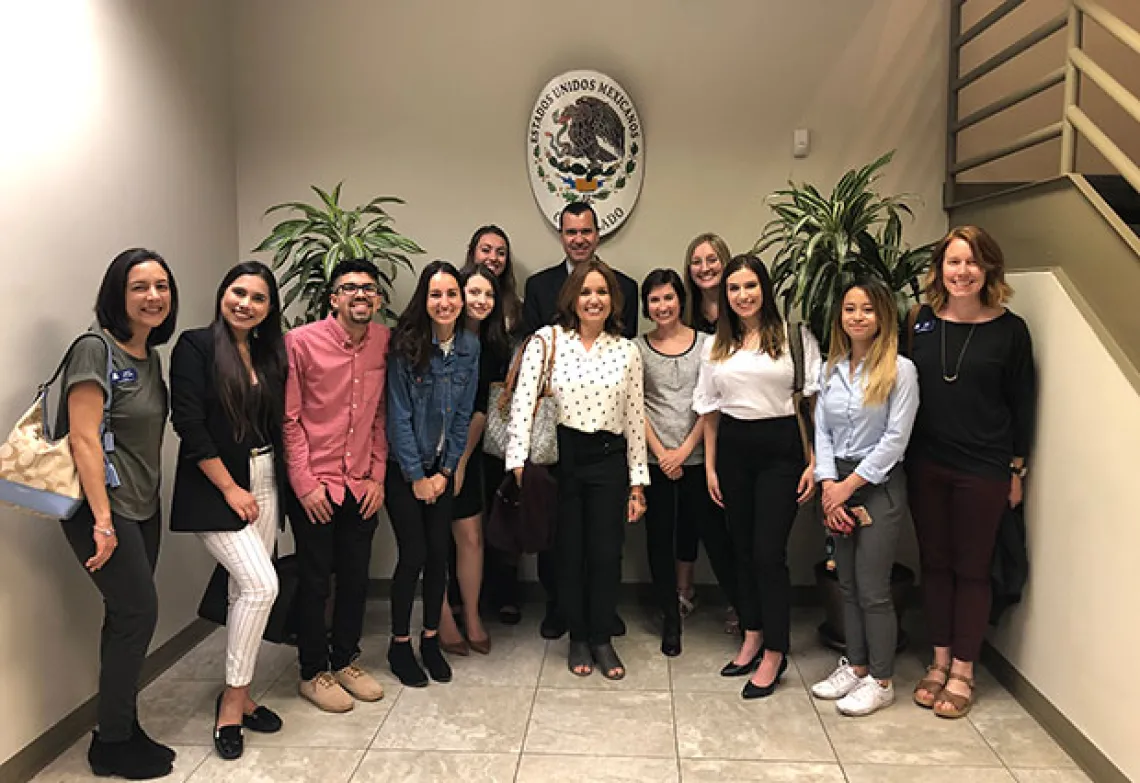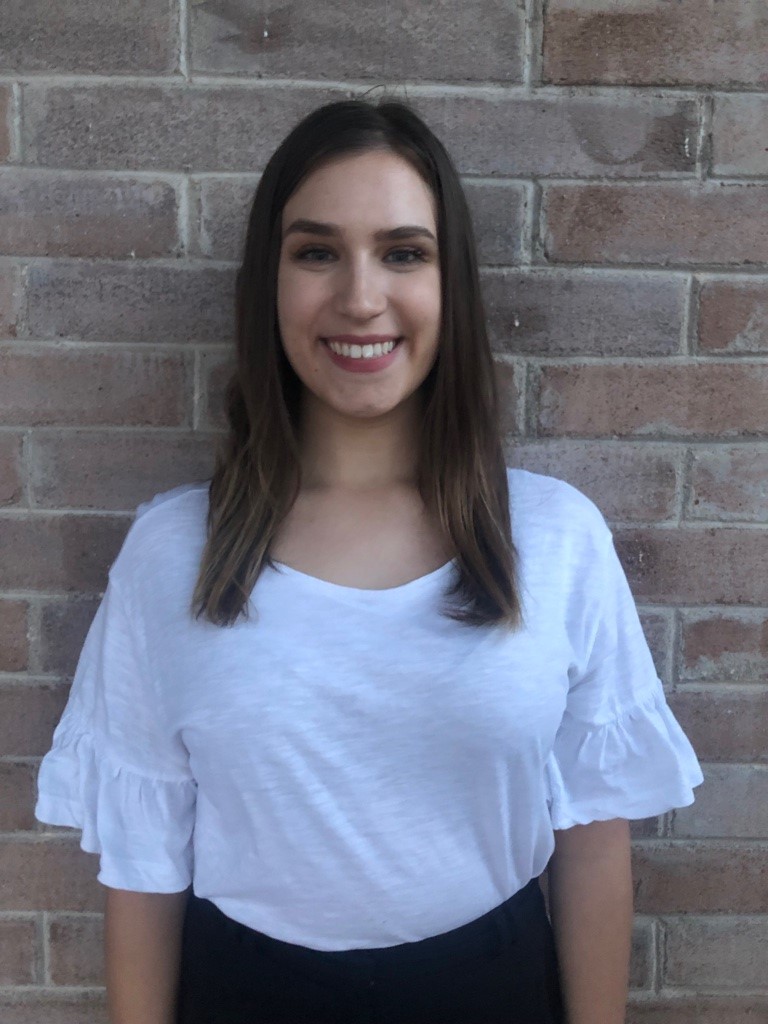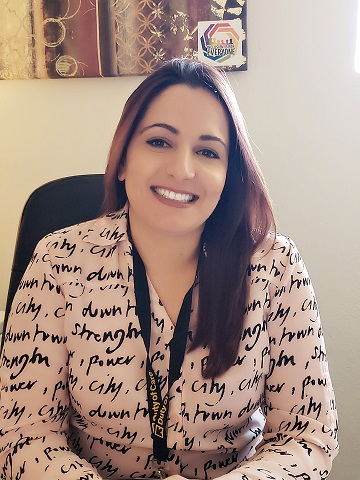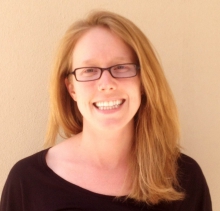UA Program Connects Students to Tucson Refugee Community

Refugee resettlement holds a deep significance for University of Arizona senior Kaela Werchniak. During World War II, her grandparents were dictated into Nazi work camps and forced labor—persecuted for their ethnicity as native Ukrainians, a group of people previously targeted by Stalin . Her grandmother's family worked in a factory; whereas her grandfather was separated from family and forced to dig ditches.
. Her grandmother's family worked in a factory; whereas her grandfather was separated from family and forced to dig ditches.
After the war ended, unable to return to their homeland for fear of continued discrimination, her grandparents spent the next five years in a displaced persons camp. Through the Displaced Persons Act, they eventually relocated to the United States, arriving by ship to New York City in 1950. After enduring years of war, forced labor and persecution, they now had a new challenge: assimilating to a vastly different culture and language.
 “They faced immense backlash and difficulties after coming over,” said Werchniak. “Parallel to much of the things we see today, there existed anti-refugee rhetoric, an ‘us-vs-them’ if you will.”
“They faced immense backlash and difficulties after coming over,” said Werchniak. “Parallel to much of the things we see today, there existed anti-refugee rhetoric, an ‘us-vs-them’ if you will.”
According to Werchniak, the U.S. government provided little support to refugees in the 1950s. Despite having two university degrees, Werchniak’s grandfather could only find work as a dishwasher and taught himself English at night.
Fast forward to 2017. An email landed in Werchniak’s inbox about a new program called the UA Refugee Project. She immediately applied. “I wanted to be the person that my grandparents never had when they first arrived in the U.S.,” she said.
Werchniak was accepted to the UA Refugee Project, a 100% Engagement initiative developed by Arizona Global to provide undergraduate students with opportunities to acquire or enhance intercultural competence by volunteering with Tucson-based refugee agencies.
Participating students attend bi-weekly lectures and complete 45 hours of service with an agency of their choosing. Projects range from after-school tutoring with refugee youth to helping refugees access government benefits.
Werchniak chose to work with Lutheran Social Services where she socializes with refugee teens and helps them with their homework.
“It’s a bit of sanctuary for them,” she said. “The teens spend all day in high school where they’re thrown in—learning the language, learning the culture, and it can be overwhelming. But at the end of the day on Tuesdays and Thursdays they come together, hang out and get help with homework. It’s like their own little refuge.”
According to the International Rescue Committee, or IRC, the number of refugees allowed into the U.S. has dropped 60 percent since 2016.
Meheria Habibi, the Resettlement Supervisor for the IRC in Tucson was a refugee herself who arrived in the U.S. from Afghanistan 17 years ago. She says Tucson is seeing fewer refugees from countries such as Sudan, Syria, Somalia and Iraq given the current political climate. 
“Refugees are just like any other human being,” she said. “They wouldn’t have left their homes if they didn’t absolutely have to. They come here seeking safety, education, and a sense of community.”
According to Habibi, most of the newly-arrived refugees in Tucson are from the Democratic Republic of the Congo, Rwanda, Burundi, Eritrea, Afghanistan and Pakistan. Despite the decrease in numbers, Habibi encourages locals to reach out.
“Ask questions, don’t just accept misinformation because it is easily accessible. Get to know refugees and their stories,” she said. “We are open in any way to help those who want to help refugees.”
Lara Pfaff, Program Director for Project Development within International Student Services, helped design the UA Refugee Project. With the number of refugees entering the U.S. at an all-time low and reduced refugee agency funding, she believes this was the best time to develop the program.
“With the cap on the number of refugees being let into the U.S. reduced to 30,000, agencies are receiving less funding,” she said. “There’s now a greater need for agencies to have volunteers to help them meet the needs of the people they are still resettling.”
 Pfaff’s background in refugee resettlement was her inspiration for starting the program, but she never expected the students to be just as inspired.
Pfaff’s background in refugee resettlement was her inspiration for starting the program, but she never expected the students to be just as inspired.
“I’ve been really impressed with how globally aware UA students are,” she said. “I think it’s great that Kaela is using her family’s story to connect to what is going on in our local community and to give back. She’s really engaged and very conscientious about the impact that she’s having.”
Despite the years of pain Werchniak’s grandparents went through, she says they fought through difficult times to give her family what she calls the “American dream of education, freedom and peace.” After working his way to a master’s degree, her grandfather was able to secure an engineering job with the Navy and begin building that dream’s foundations.
“I am in a unique position now where I still see the effects of the war on my family, yet I am removed enough to be able to choose what to do with it,” she added.
Werchniak expressed her gratitude for the experiences the UA Refugee Project has given her. It has allowed her to give back and provide the type of support her family never received. More than that, though, she says it opened her eyes.
“If my grandparents’ story teaches anyone anything, I would hope they see that refugees are people. They are people who have seen the worst that mankind has to offer, and despite everything going against them, they are determined to keep pushing forward. I think that’s the biggest, the best, thing I’ve learned—the resilience of the human spirit.”
More Info:
Undergraduate students interested in participating in the UA Refugee Project should apply by April 1, 2019.
If you have more questions, please contact Lara Pfaff at larapfaff@email.arizona.edu.

